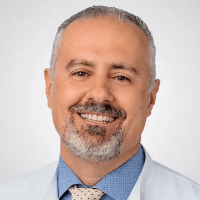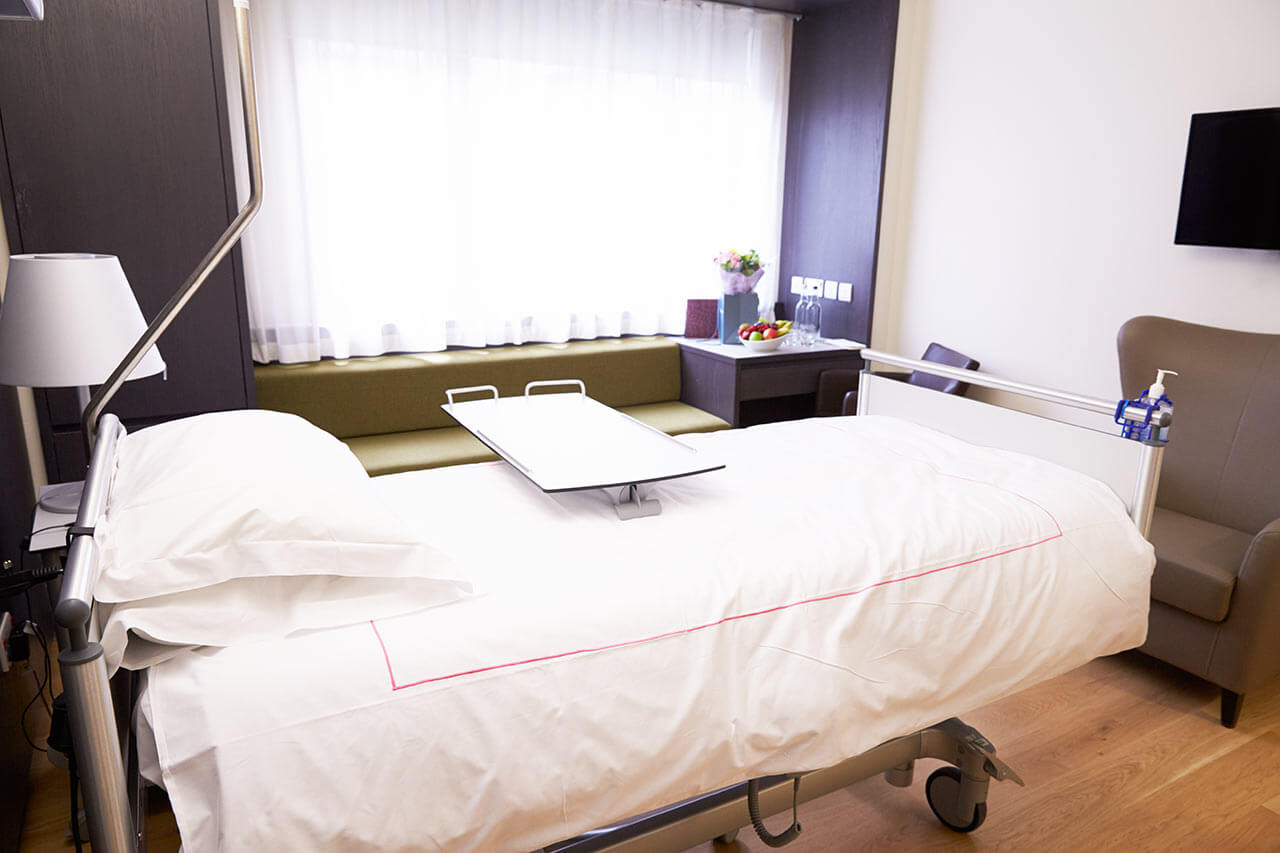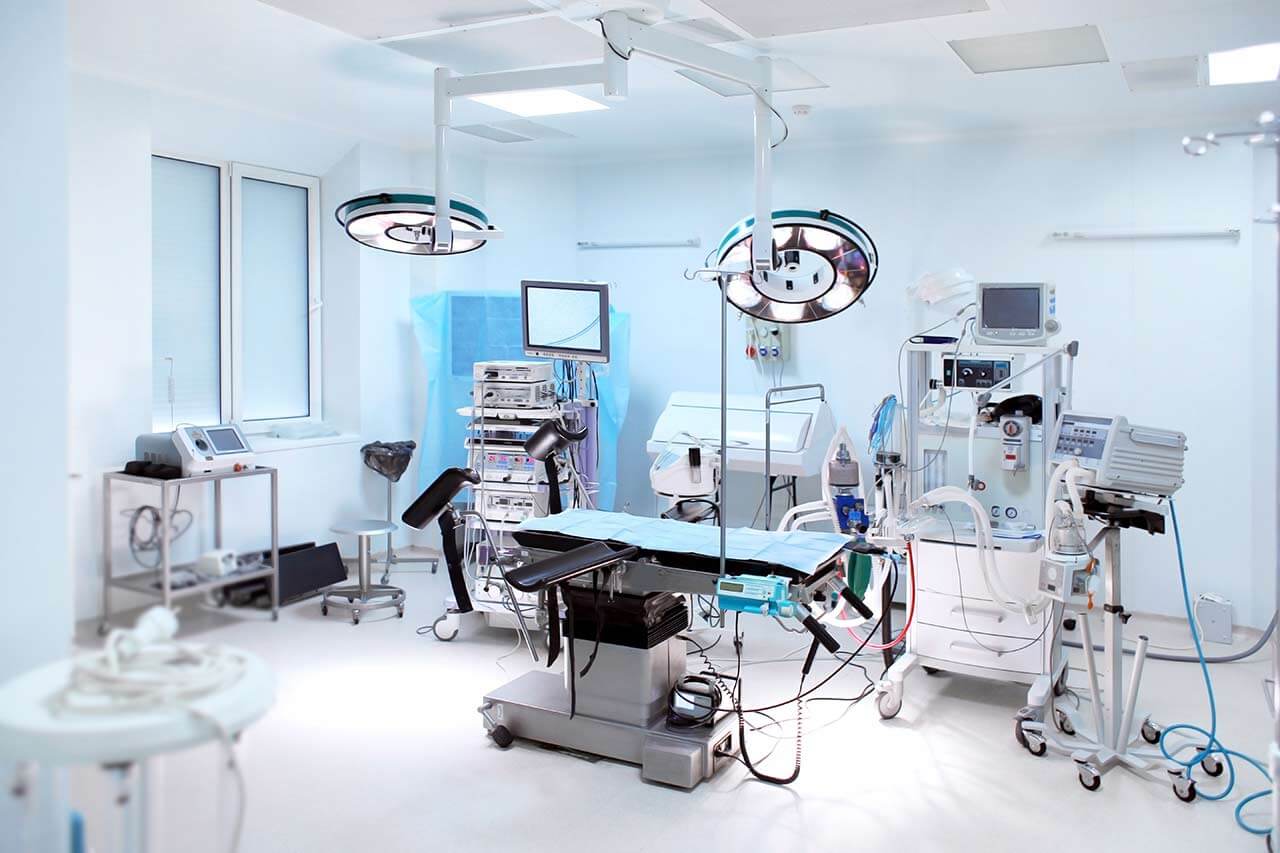
The program includes:
- Initial presentation in the clinic
- clinical history taking
- review of medical records
- physical examination
- laboratory tests:
- complete blood count
- general urine analysis
- biochemical analysis of blood
- inflammation indicators (CRP, ESR)
- indicators blood coagulation
- neurological examination
- functionality x-ray
- CT/MRI scan
- neuropsychological tests (on indications):
- ENMG (electroneuromyography)
- SEPs (somatosensory evoked potentials)
- postoperative control
- tumor resection under neuronavigation
- histologically and immunohistochemically
examination of the remote tissues - postoperative control
- symptomatic treatment
- control examinations
- the cost of essential medicines and materials
- nursing services
- full hospital accommodation
- developing of further guidance by specialists
in oncology and radiotherapy
Required documents
- Medical records
- MRI/CT scan (if available)
Service
You may also book:
 BookingHealth Price from:
BookingHealth Price from:
About the department
According to the reputable German Focus magazine, the Department of Spinal Surgery at the ATOS Orthoparc Clinic Cologne ranks among the best medical facilities in Germany for the treatment of spinal pathologies!
The department provides conservative and surgical treatment of the entire spectrum of spinal diseases: cervical, thoracic, and lumbar disc herniation, spinal stenosis, spondylolisthesis, scoliosis, spinal fractures, facet syndrome, and myelopathies. The medical institution has gained vast clinical experience, thanks to which the specialists provide effective medical care to patients with spinal diseases of any complexity. The department provides conservative treatment using the latest generation of drugs, physiotherapeutic procedures, therapeutic exercises, and massage. Periradicular therapy, facet joint block, and epidural block are offered to eliminate severe back pain. These methods involve targeted injection of analgesics into the pathological focus under imaging guidance. Spinal surgery is the last-line treatment when other methods fail. The department's spinal surgeons successfully perform minimally invasive, microsurgical, and endoscopic interventions on the spine, with postoperative recovery lasting only a few days. The Head Physician of the department is Dr. med. Charilaos Christopoulos.
Herniated discs are the most common diagnosis in the daily clinical practice of doctors. Specialists have excellent qualifications in the treatment of cervical, thoracic, and lumbar disc herniation. Lumbar disc herniation is the most common. This pathological condition causes the protrusion of the intervertebral disc beyond its normal location, resulting in severe pain, limited mobility, and other symptoms. During the diagnosis for disc herniation, the department's specialists study the patient's medical history, conduct X-rays, magnetic resonance imaging, and/or computed tomography. In most cases, the disease responds well to conservative therapy with exercise therapy, physiotherapy, drug therapy with painkillers, spinal blocks, laser therapy, cryotherapy, heat therapy, and other methods. The optimal set of therapeutic measures for the patient is selected individually, depending on the stage of the disease and the severity of symptoms. The average duration of conservative treatment of lumbar disc herniation is 8-12 weeks. If such treatment does not bring the desired result, the patient is recommended to undergo surgery. Operations for herniated discs are performed in the department using sparing arthroscopic techniques through a 2-3 cm incision, which allows to remove the herniation and maintain the stability of the spine. Immediately after the operation, the patient is put in a vertical position and can move independently.
The team of spinal surgeons in the department specializes in the treatment of spinal stenosis. The pathology is associated with a narrowing of the internal lumen of the spinal canal and compression of the spinal nerves, which causes back pain. Diagnosis of spinal stenosis involves physical examination, X-ray, magnetic resonance imaging, and/or computed tomography. If the diagnosis is confirmed, the patient will be prescribed an individual treatment regimen. Without timely treatment, the condition will worsen, potentially leading to disability. Early stages of spinal stenosis are treated with conservative methods. A treatment regimen includes drug therapy, physiotherapy, therapeutic exercises, heat therapy, lymphatic drainage, massage, and other procedures. If conservative measures do not eliminate the symptoms and the risk of developing a neurological deficit remains, the medical team of the department performs surgery. Depending on the clinical case, the specialists perform laminectomy, laminotomy, foraminotomy, or spondylodesis. Surgical procedures are often performed endoscopically with minimal trauma rate to healthy tissue.
The therapeutic options of the department are complemented by the treatment of facet syndrome, a lesion of the facet joints from the cervical to the lumbosacral spine. The main clinical manifestation of this pathology is severe pain. Monotonous dull pain occurs with any physical activity, bending, turning, and as the disease progresses, it persists at rest. To confirm the diagnosis, the department's specialists study the patient's complaints, conduct a physical examination with palpation of the spinal column, and prescribe instrumental diagnostics (X-ray, CT, and/or MRI). The first-line treatment is conservative therapy aimed at relieving pain and maintaining spinal mobility. The mainstay of treatment is physiotherapy, supplemented by tablets, spinal orthoses, and local injections of analgesics, hyaluronic acid, or autologous plasma. Doctors in the department also use ultrasound therapy. If conservative therapy fails, spinal surgeons recommend surgery. One of the most effective surgical procedures is minimally invasive thermodenervation; in complex cases, surgeons perform spondylodesis.
The department's range of medical services includes the following:
- Conservative and surgical treatment of cervical, thoracic, and lumbar disc herniation
- Conservative and surgical treatment of spinal stenosis
- Conservative and surgical treatment of spondylolisthesis
- Conservative and surgical treatment of scoliosis
- Conservative and surgical treatment of spinal fractures
- Conservative and surgical treatment of facet syndrome
- Conservative and surgical treatment of spinal injuries, including osteoporotic vertebral fractures and their complications
- Conservative and surgical treatment of myelopathy
- Conservative and surgical treatment of other spinal diseases
The department's therapeutic options include the following:
- Conservative treatment
- Drug therapy
- Physiotherapy
- Therapeutic exercises
- Lymphatic drainage massage
- Classical massage
- Manual therapy
- Laser therapy
- Cryotherapy
- Heat therapy
- Electrotherapy
- Local injection therapy under imaging guidance
- Surgical treatment
- Minimally invasive procedures
- Endoscopic procedures
- Microsurgical procedures
- Other treatment methods
Curriculum vitae
Higher Education and Professional Career
- 1990 - 1996 Medical studies, Humboldt University of Berlin.
- 1997 - 1999 Internship, Department of Neurosurgery, Hospital Berlin-Friedrichshain (academic hospital of the Humboldt University of Berlin).
- 1999 - 2002 Assistant Physician, Department of Neurosurgery, Suedharz Hospital Nordhausen (academic hospital of the University of Goettingen).
- 2002 - 2005 Assistant Physician, Department of Neurosurgery, Hospital Cologne-Merheim.
- 2005 Board certification in Neurosurgery.
- 2005 - 2006 Neurosurgeon, Department of Neurosurgery, Hospital Cologne-Merheim.
- 2006 - 2010 Senior Physician, Department of Neurosurgery, General Hospital Herdecke (academic hospital of Witten/Herdecke University).
- 2010 - 2011 Physician, Center for Spinal Surgery, ATOS MediaPark Clinic Cologne; Consultant Physician, Sana Hospital Remscheid.
- Since 2011 Head Physician, Department of Spinal Surgery, ATOS Orthoparc Clinic Cologne.
- 2012 - 2015 Cooperation Partner, Sana Hospital Remscheid.
Qualifications
- Board certification in Neurosurgery.
- Master's certificate from the German Spine Surgery (DWG).
Memberships in Professional Societies
- German Society of Neurosurgery (DGNC).
- German Spine Surgery (DWG).
- Hellenic Neurological Society (ENE).
- Medical Association of North Rhine (ÄKN0).
- Athens Medical Association (AMA).
- AO Spine.
Photo of the doctor: (c) ATOS Orthoparc Klinik Köln
About hospital
According to the prestigious German Focus magazine, the ATOS Orthoparc Clinic Cologne is one of the best medical facilities in Germany in the field of knee, hip, and shoulder surgery, as well as in the field of foot surgery and spinal surgery!
The clinic specializes in conservative and surgical treatment of musculoskeletal pathologies of any complexity. Of particular interest to the ATOS Orthoparc Clinic Cologne are such areas of orthopedics as knee and hip arthroplasty, arthroscopic interventions on large joints, treatment of foot and hand pathologies, treatment of sports injuries, treatment of osteoporosis, and conservative and surgical treatment of spinal diseases and injuries. The clinic's daily work is based on the principle of providing high-quality medical care, taking into account the individual needs of each patient. The clinic offers modern infrastructure, state-of-the-art equipment, and highly qualified personnel. The specialists are attentive, responsive, and always ready to answer patients' questions, ensuring a comfortable stay and high-quality treatment.
Only highly effective methods are used during the therapeutic process. Conservative therapy (for example, treatment with tablets, intra-articular injections, physiotherapy, or massage) is always used as first-line treatment; the decision to perform surgery is made only when conservative methods fail. Surgical procedures are performed in high-tech operating rooms. Doctors almost always use sparing minimally invasive and arthroscopic techniques, which significantly shorten the postoperative recovery period. After knee and hip replacement surgery, patients are offered a unique Rapid Recovery program.
The ATOS Orthoparc Clinic Cologne has been successfully operating for several decades, during which time it has managed to take a leading position among orthopedic centers in the national healthcare system. The clinic's specialists regularly treat many patients from abroad, which testifies to the excellent reputation of the medical institution in the international medical arena. The clinic strictly adheres to hygiene and safety standards. The doctors are guided by the current clinical protocols and recommendations of the German Society for Orthopedics and Trauma Surgery (DGOU) and the German Society for Orthopedics and Orthopedic Surgery (DGOOC). Great importance is attached to understanding the individual needs of patients and treating them with humanity and respect.
Photo: (с) depositphotos
Accommodation in hospital
Patients rooms
The patients at the ATOS Orthoparc Clinic Cologne stay in comfortable single and double rooms decorated in bright colors. The standard patient room includes an automatically adjustable bed with an orthopedic mattress, a nightstand, a table, a chair, a telephone, and a TV. The patient rooms are also equipped with lockers for personal belongings. Each patient room has an ensuite bathroom with a shower and toilet.
The clinic has a pleasant and calm atmosphere, which contributes to the positive attitude of the patients and their rapid recovery.
Meals and Menus
The clinic offers delicious and balanced meals three times a day: breakfast, lunch, and dinner. Meals are provided by renowned international catering company SV Group with the participation of professional nutritionists.
If, for some reason, you cannot eat all the products, you will be offered an individual menu. Please inform the medical staff of your dietary preferences prior to the start of your treatment.
Further details
Standard rooms include:
![]() Toilet
Toilet
![]() Shower
Shower
![]() Wi-Fi
Wi-Fi
![]() TV
TV
Accompanying person
Your accompanying person may stay with you in your patient room or at the hotel of your choice during the inpatient program.
Hotel
You may stay at the hotel of your choice during the outpatient program. Our managers will support you for selecting the best option.




